|
|
|
Sort Order |
|
|
|
Items / Page
|
|
|
|
|
|
|
| Srl | Item |
| 1 |
ID:
029280
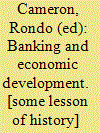

|
|
|
|
|
| Publication |
New York, Oxford University Press, 1972.
|
| Description |
ix, 267p.
|
|
|
|
|
|
|
|
|
|
|
|
Copies: C:1/I:0,R:0,Q:0
Circulation
| Accession# | Call# | Current Location | Status | Policy | Location |
| 011427 | 332.1/CAM 011427 | Main | On Shelf | General | |
|
|
|
|
| 2 |
ID:
157119
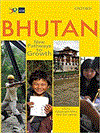

|
|
|
|
|
| Publication |
New Delhi, Oxford University Press, 2017.
|
| Description |
xxxvii, 467p.: tables, figures, boxeshbk
|
| Standard Number |
9780199474011
|
|
|
|
|
|
|
|
|
|
|
|
Copies: C:1/I:0,R:0,Q:0
Circulation
| Accession# | Call# | Current Location | Status | Policy | Location |
| 059281 | 381.5/MIT 059281 | Main | On Shelf | General | |
|
|
|
|
| 3 |
ID:
150055


|
|
|
|
|
| Summary/Abstract |
This paper studies various options to support allowance prices in the EU Emissions Trading System (ETS), such as adjusting the cap, an auction reserve price, and fixed and variable carbon taxes in addition to the EU ETS. We use a dynamic computable general equilibrium model that explicitly allows for allowance banking and for a detailed cost-effectiveness analysis at the EU Member State level. We find that tightening the cap provides an ad hoc solution to the fundamental issue of the robustness of the effective carbon price, while introducing a price component to the ETS brings structural carbon price support in times of negative demand shocks for emission allowances. These price-based policies still benefit from the intertemporal flexibility through the banking provision in the EU ETS by re-allocating emissions over time with stronger emission reductions in early years and emission increases in later years. A higher emission price has a larger negative impact on the new Member States' economies than on other Member States. Furthermore, introducing a carbon tax in addition to the EU ETS decreases the price of allowances, resulting in welfare gains for net buyers of allowances while net sellers are worse off.
|
|
|
|
|
|
|
|
|
|
|
|
|
|
|
|
| 4 |
ID:
172205
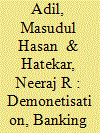

|
|
|
|
|
| Summary/Abstract |
This article seeks to advance contextualised understanding of the extent to which a cashless economy in India can be a feasible developmental goal. Initially, impressed with critiques of the sudden ‘demonetisation’ on 8 November 2016, we conducted econometric research to test how banks (‘bricks’) could be brought closer to rural people. However, this traditional approach of envisaging more banks was rapidly overtaken by the massive uptake of digital payment methods (‘clicks’) in India since 2016. Partly driven by the Reserve Bank of India (RBI), this has raised new concerns and research agenda focused on people’s trust in banking and new technologies, consumer skills and people’s basic rights vis-à-vis a state that, controversially, now seems to be seeking more control within a relentlessly changing postmodern scenario.
|
|
|
|
|
|
|
|
|
|
|
|
|
|
|
|
| 5 |
ID:
189533
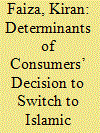

|
|
|
|
|
| Summary/Abstract |
Islamic banking is becoming a major alternative to conventional banking in many parts of the world, including the Gulf region. Although one of the prevalent reasons includes religious inclination, the variety of products added by Islamic banks contributes to customers switching from conventional to Islamic banking. This study analyses the factors responsible for customers’ decision to switch to Islamic banking in Oman through a questionnaire survey from Omani nationals in Muscat, Salalah, and Sohar. The data analysis tool included Structural Equation Modelling (SEM) analysis using SPSS and AMOS software. Some of the variables incorporated in the study include physical quality, outcome quality, interaction quality, customer satisfaction, trust, price, religion, and social prestige, which are the dependent variables. The independent variable includes the decision to switch. These variables have been incorporated to evaluate their impact on customers’ decision-making to switch from conventional to Islamic banking. The results indicate that interaction quality significantly influences the switching decision, whereas physical environment and outcome quality could not influence the decision. Moreover, customer satisfaction and trust positively affect the decision. Religion significantly influences switching decisions, while the price and social prestige have no association with it. The findings suggest that religion is a strong determinant and positively impacts switching decisions. Additionally, the people of Oman consider the quality of service, customer service, and trust before switching decisions.
|
|
|
|
|
|
|
|
|
|
|
|
|
|
|
|
| 6 |
ID:
182935
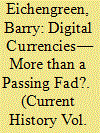

|
|
|
|
|
| Summary/Abstract |
The financial system is currently in a period of exceptionally rapid technological and organizational change, with the adoption of cloud computing to store and process financial data, artificial intelligence to analyze it, and blockchain to secure it. It is fashionable to assert that digital currencies will be part of that future. But cryptocurrencies like Bitcoin are too volatile to possess the essential attributes of money. Stablecoins have fragile currency pegs that diminish their utility in transactions. And central bank digital currencies are a solution in search of a problem.
|
|
|
|
|
|
|
|
|
|
|
|
|
|
|
|
| 7 |
ID:
187834
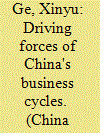

|
|
|
|
|
| Summary/Abstract |
We study the approximate sources of China's business cycles in an estimated dynamic stochastic general equilibrium (DSGE) model with housing and banking. The model replicates well the volatility and cyclicality of key macroeconomic variables observed in the past two decades in China. A host of shock decomposition exercises demonstrate that, among the shocks being considered, both financial and housing shocks are driving China's business cycles, accounting for a particularly large fraction of the variance in most macroeconomic and financial variables at the business cycle frequencies. In particular, the capital quality, housing demand, and loan-to-value shocks display prominent contributions to the business cycle fluctuations. Moreover, there exists substantial interactions between the banking and housing sectors in China, where the collateral constraint and the financial constraint amplify with each other. The results shed new light in the understanding of China's business cycles, and may serve as a useful benchmark for future quantitative analyses of China's macroeconomic fluctuations using DSGE frameworks.
|
|
|
|
|
|
|
|
|
|
|
|
|
|
|
|
| 8 |
ID:
092540
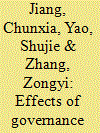

|
|
|
|
|
| Publication |
2009.
|
| Summary/Abstract |
China has accelerated banking reform since joining the Word Trade Organisation (WTO) in 2001. Employing a stochastic distance function approach, this paper examines bank technical efficiency and differentiates the static, selection and dynamic governance effects on bank efficiency for the 11-year period 1995-2005. The results show that bank efficiency has improved. Joint-stock ownership is associated with better performance in terms of profitability than state ownership (static effect). Strong selection effects are found for both foreign acquisition and going public reform strategies. Foreign acquisition may benefit domestic banks by efficiency gains in the long run, but privatization via initial public offerings (IPOs) appears to have only some short-term effects.
|
|
|
|
|
|
|
|
|
|
|
|
|
|
|
|
| 9 |
ID:
103951
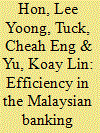

|
|
|
| 10 |
ID:
178428


|
|
|
|
|
| Summary/Abstract |
This article examines the nexus between financial inclusion index and economic growth in all eight South Asian Association for Regional Cooperation (SAARC) countries, using annual data from 2004 to 2017. In order to determine the possible long-run relationship between these variables, the study adopted the Pedroni panel co-integration test and two types of co-integration regression methods, the Fully Modified Ordinary Least Square (FMOLS) and the Dynamic Ordinary Least Square (DOLS) methods. The Pedroni panel co-integration test confirms the existence of a long-run relationship between financial inclusion and economic growth in the SAARC countries. The coefficients of FMOLS and DOLS indicate that the index of financial inclusion and selected control variables together support economic growth. In addition, the Granger causality test confirmed bi-directional causality between FI and economic growth.
|
|
|
|
|
|
|
|
|
|
|
|
|
|
|
|
| 11 |
ID:
135051
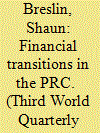

|
|
|
|
|
| Summary/Abstract |
The reappearance of substantial debt in China after 2008 has refocused attention on the sustainability of the existing financial ‘model’. It’s not just that ‘traditional’ forms of bank-centred debt have re-emerged, but that the informal ‘shadow banking’ sector also seems increasingly fragile, generating debts that do not seem easy to repay. Explanations for the current situation focus on the way in which China responded to the global financial crisis, and on the incentives that exist to go outside the formal and more regulated banking system into often riskier activities. But there are more fundamental structural issues. The current financial system contains within it some of the dna of its predecessor, while the spatial distribution of power and authority is inextricably linked to the way the financial system functions. While it might be possible to tinker with some elements of current financial problems, the relationship between local government financing, land, the banking system and key economic sectors makes it difficult to resolve more structural issues without taking a holistic approach; one that would have fundamental consequences for the nature of the Chinese state, and the distribution of power within it.
|
|
|
|
|
|
|
|
|
|
|
|
|
|
|
|
| 12 |
ID:
089552
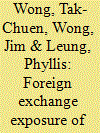

|
|
|
|
|
| Publication |
2009.
|
| Summary/Abstract |
Using the capital market approach and the equity price data of 14 listed Chinese banks, this empirical study finds that there is a positive relationship between bank size and foreign exchange exposure. This relationship may reflect the larger foreign exchange operations and trading positions of larger Chinese banks and their significant indirect foreign exchange exposure arising from impacts of the renminbi exchange rate movements on their customers. Empirical evidence also suggests that the average foreign exchange exposures of state-owned and joint-stock commercial banks in China are higher than those of banks in Hong Kong, notwithstanding their limited participation in international banking businesses compared with their Hong Kong counterparts. It is also found that negative foreign exchange exposure is prevalent for larger Chinese banks, suggesting that an appreciation of the renminbi tends to reduce their equity value. It is therefore likely that the banking sector's performance will be hampered. Together with the fact that decreases in equity values generally imply a higher default risk, the effects of different scenarios of renminbi appreciation on the default risk of Chinese banks should therefore be closely monitored.
|
|
|
|
|
|
|
|
|
|
|
|
|
|
|
|
| 13 |
ID:
081897
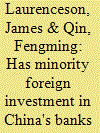

|
|
|
|
|
| Publication |
2008.
|
| Summary/Abstract |
Since 2001, foreign investors have been permitted to acquire minority ownership stakes in China's banks. This paper assesses whether there is any evidence of a cost efficiency payoff in those banks that have taken on foreign investment. Data envelopment analysis is first used to generate measures of cost efficiency for China's banks over the period 2001-2006. A second stage regression is then performed to determine whether foreign investment has an impact on cost efficiency. The results indicate a positive relationship, although one that is not statistically significant. Policy implications are discussed
|
|
|
|
|
|
|
|
|
|
|
|
|
|
|
|
| 14 |
ID:
137532
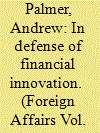

|
|
|
|
|
| Summary/Abstract |
At a 2013 conference held by The Economist in New York, business and policy leaders debated whether talented university graduates should join Google or Goldman Sachs. Vivek Wadhwa, a serial entrepreneur, spoke up for Google. “Would you rather have your children engineering the financial system [and] creating more problems for us, or having a chance of saving the world?” he asked. He had a much easier time pitching his case than Robert Shiller, the Nobel Prize–winning economist who advocated for Goldman Sachs by arguing that every human activity, even saving the world, had to be financed. No use; in the end, the audience voted heavily in favor of Mountain View and against Wall Street.
|
|
|
|
|
|
|
|
|
|
|
|
|
|
|
|
| 15 |
ID:
153004
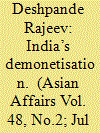

|
|
|
|
|
| Summary/Abstract |
This article offers an account of the impact of Indian PM Narendra Modi’s decision in November 2016 to withdraw suddenly all Rs 500 and Rs 1000 notes from circulation in India with the avowed intent of combatting fraud, tax avoidance and other economic problems. The article assesses the impact from the demonetisation in November to the March 2017 Indian regional elections, where wide-scale victories for Modi’s political party, the BJP, appear to have vindicated his reforms. The article provides an analysis of the political background of the period, as well as looking at the economic and societal impact of the changes, including the way in which the behaviour of Indian citizens has been ‘nudged’ with particular regard to use of banking, transactions, social effects, and payment of tax.
|
|
|
|
|
|
|
|
|
|
|
|
|
|
|
|
| 16 |
ID:
133439
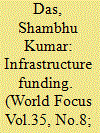

|
|
|
|
|
| Publication |
2014.
|
| Summary/Abstract |
While infrastructure development has always been the top agenda for India, considering the current global economic dynamics as well as domestic growth imperatives, it has emerged as one of the single largest imperatives which could seriously compromise the economic growth trajectory. The Indian Economy is currently going through a challenging phase as GDP growth has slowed down to nearly a decade low in 2012-13. Most projectors envisage a slow build up to the 8-10% GDP growth. Infrastructure spend is likely to have a positive spiral effect to the GDP growth and is likely to be one of the main levers to unleash India's economic growth potential.
|
|
|
|
|
|
|
|
|
|
|
|
|
|
|
|
| 17 |
ID:
084235
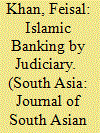

|
|
|
|
|
| Publication |
2008.
|
| Summary/Abstract |
The most likely route for Islamisation in Pakistan is not Islamist political parties, or military officers, but its Supreme Court enforcing the Islamic provisions of the country's Constitution. In 1999, at the culmination of two decades of increasing Islamisation, the Pakistani Supreme Court ruled the country's entire banking system, officially Islamic since 1985, to be insufficiently so. It ordered its complete restructuring. Now direct equity participation by banks was the sole permissible financing mode. This happened mainly due to the constitutionally-mandated roles for sharia and the ulema in the legal system. Yet upon final appeal, the Court reversed its ruling and remanded the issue to a lower court for further study, thereby granting the banking system a reprieve. How permanent is this reprieve likely to be?
|
|
|
|
|
|
|
|
|
|
|
|
|
|
|
|
| 18 |
ID:
043991


|
|
|
|
|
| Publication |
New Delhi, Indian Book co., 1975.
|
| Description |
324p.
|
|
|
|
|
|
|
|
|
|
|
|
Copies: C:1/I:0,R:0,Q:0
Circulation
| Accession# | Call# | Current Location | Status | Policy | Location |
| 016189 | 332/GAL 016189 | Main | On Shelf | General | |
|
|
|
|
| 19 |
ID:
169771


|
|
|
|
|
| Summary/Abstract |
From inauspicious beginnings in a post-socialist, highly dysfunctional financial system, Angolan banking grew in less than a decade after the end of the country’s long civil war into one of Africa’s largest. Fuelled by the country’s oil boom, banks became crucial in articulating Angola’s interactions with the international system as well as a domestic agenda of oligarchic consolidation by the ruling MPLA’s elite. This article describes and analyses this growth trajectory in its historical and institutional context and seeks to understand the reasons why it did not lead to either a significant expansion of credit outside the elite or a contribution towards economic diversification outside the oil sector. Important as a study of the political economy of finance in Africa’s third largest economy, the article also contributes to the growing literature on the nexus between banking and politics in resource-rich states.
|
|
|
|
|
|
|
|
|
|
|
|
|
|
|
|
| 20 |
ID:
099392


|
|
|
|
|
| Publication |
Washington, DC, World Bank, 2010.
|
| Description |
xviii, 103p.
|
| Standard Number |
9780821382493
|
|
|
|
|
|
|
|
|
|
|
|
Copies: C:1/I:0,R:0,Q:0
Circulation
| Accession# | Call# | Current Location | Status | Policy | Location |
| 055306 | 332.42/GRE 055306 | Main | On Shelf | General | |
|
|
|
|
|
|
|
|
|